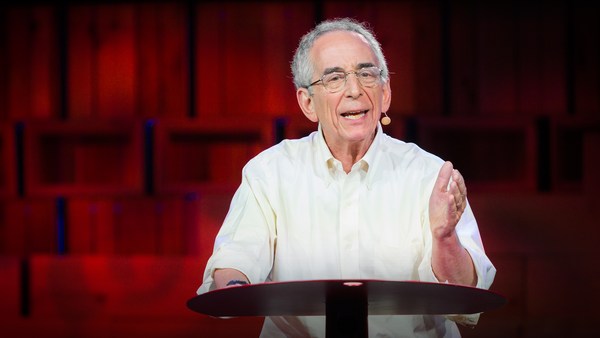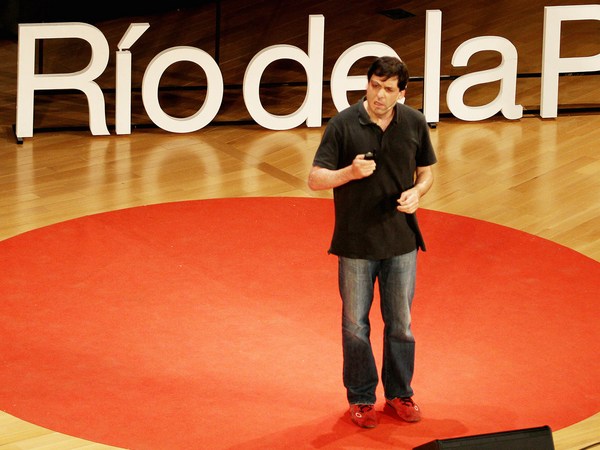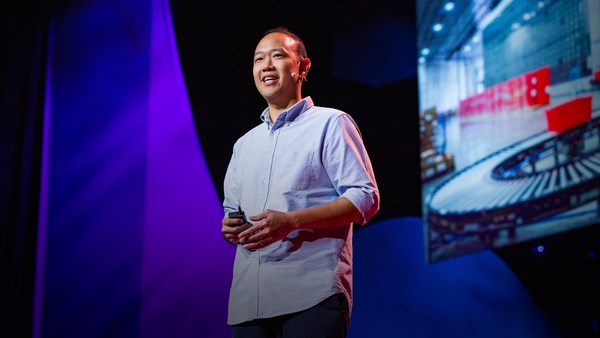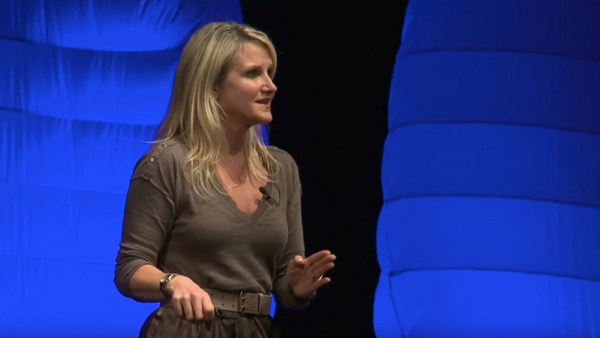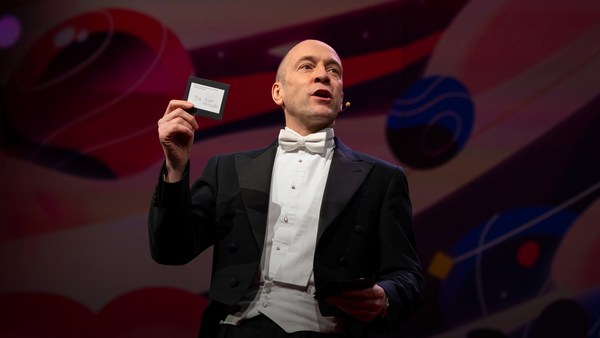Wow, what an honor. I always wondered what this would feel like.
So eight years ago, I got the worst career advice of my life. I had a friend tell me, "Don't worry about how much you like the work you're doing now. It's all about just building your resume."
And I'd just come back from living in Spain for a while, and I'd joined this Fortune 500 company. I thought, "This is fantastic. I'm going to have big impact on the world." I had all these ideas. And within about two months, I noticed at about 10am every morning I had this strange urge to want to slam my head through the monitor of my computer. I don't know if anyone's ever felt that. And I noticed pretty soon after that that all the competitors in our space had already automated my job role. And this is right about when I got this sage advice to build up my resume.
Well, as I'm trying to figure out what two-story window I'm going to jump out of and change things up, I read some altogether different advice from Warren Buffett, and he said, "Taking jobs to build up your resume is the same as saving up sex for old age."
(Laughter)
And I heard that, and that was all I needed. Within two weeks, I was out of there, and I left with one intention: to find something that I could screw up. That's how tough it was. I wanted to have some type of impact. It didn't matter what it was.
And I found pretty quickly that I wasn't alone: it turns out that over 80 percent of the people around don't enjoy their work. I'm guessing this room is different, but that's the average that Deloitte has done with their studies. So I wanted to find out, what is it that sets these people apart, the people who do the passionate, world-changing work, that wake up inspired every day, and then these people, the other 80 percent who lead these lives of quiet desperation.
So I started to interview all these people doing this inspiring work, and I read books and did case studies, 300 books altogether on purpose and career and all this, totally just self-immersion, really for the selfish reason of -- I wanted to find the work that I couldn't not do, what that was for me.
But as I was doing this, more and more people started to ask me, "You're into this career thing. I don't like my job. Can we sit down for lunch?" I'd say, "Sure." But I would have to warn them, because at this point, my quit rate was also 80 percent. Of the people I'd sit down with for lunch, 80 percent would quit their job within two months. I was proud of this, and it wasn't that I had any special magic. It was that I would ask one simple question. It was, "Why are you doing the work that you're doing?" And so often their answer would be, "Well, because somebody told me I'm supposed to." And I realized that so many people around us are climbing their way up this ladder that someone tells them to climb, and it ends up being leaned up against the wrong wall, or no wall at all.
The more time I spent around these people and saw this problem, I thought, what if we could create a community, a place where people could feel like they belonged and that it was OK to do things differently, to take the road less traveled, where that was encouraged, and inspire people to change? And that later became what I now call Live Your Legend, which I'll explain in a little bit. But as I've made these discoveries, I noticed a framework of really three simple things that all these different passionate world-changers have in common, whether you're a Steve Jobs or if you're just, you know, the person that has the bakery down the street. But you're doing work that embodies who you are. I want to share those three with you, so we can use them as a lens for the rest of today and hopefully the rest of our life.
The first part of this three-step passionate work framework is becoming a self-expert and understanding yourself, because if you don't know what you're looking for, you're never going to find it. And the thing is that no one is going to do this for us. There's no major in university on passion and purpose and career. I don't know how that's not a required double major, but don't even get me started on that. I mean, you spend more time picking out a dorm room TV set than you do you picking your major and your area of study. But the point is, it's on us to figure that out, and we need a framework, we need a way to navigate through this.
And so the first step of our compass is finding out what our unique strengths are. What are the things that we wake up loving to do no matter what, whether we're paid or we're not paid, the things that people thank us for? And the Strengths Finder 2.0 is a book and also an online tool. I highly recommend it for sorting out what it is that you're naturally good at.
And next, what's our framework or our hierarchy for making decisions? Do we care about the people, our family, health, or is it achievement, success, all this stuff? We have to figure out what it is to make these decisions, so we know what our soul is made of, so that we don't go selling it to some cause we don't give a shit about.
And then the next step is our experiences. All of us have these experiences. We learn things every day, every minute about what we love, what we hate, what we're good at, what we're terrible at. And if we don't spend time paying attention to that and assimilating that learning and applying it to the rest of our lives, it's all for nothing. Every day, every week, every month of every year I spend some time just reflecting on what went right, what went wrong, and what do I want to repeat, what can I apply more to my life.
And even more so than that, as you see people, especially today, who inspire you, who are doing things where you say "Oh God, what Jeff is doing, I want to be like him." Why are you saying that? Open up a journal. Write down what it is about them that inspires you. It's not going to be everything about their life, but whatever it is, take note on that, so over time we'll have this repository of things that we can use to apply to our life and have a more passionate existence and make a better impact. Because when we start to put these things together, we can then define what success actually means to us, and without these different parts of the compass, it's impossible. We end up in the situation -- we have that scripted life that everybody seems to be living going up this ladder to nowhere.
It's kind of like in Wall Street 2, if anybody saw that, the peon employee asks the big Wall Street banker CEO, "What's your number? Everyone's got a number, where if they make this money, they'll leave it all." He says, "Oh, it's simple. More." And he just smiles. And it's the sad state of most of the people that haven't spent time understanding what matters for them, who keep reaching for something that doesn't mean anything to us, but we're doing it because everyone said we're supposed to. But once we have this framework together, we can start to identify the things that make us come alive. You know, before this, a passion could come and hit you in the face, or maybe in your possible line of work, you might throw it away because you don't have a way of identifying it. But once you do, you can see something that's congruent with my strengths, my values, who I am as a person, so I'm going to grab ahold of this, I'm going to do something with it, and I'm going to pursue it and try to make an impact with it.
And Live Your Legend and the movement we've built wouldn't exist if I didn't have this compass to identify, "Wow, this is something I want to pursue and make a difference with." If we don't know what we're looking for, we're never going to find it, but once we have this framework, this compass, then we can move on to what's next -- and that's not me up there -- doing the impossible and pushing our limits. There's two reasons why people don't do things. One is they tell themselves they can't do them, or people around them tell them they can't do them. Either way, we start to believe it. Either we give up, or we never start in the first place.
The things is, everything was impossible until somebody did it. Every invention, every new thing in the world, people thought were crazy at first. Roger Bannister and the four-minute mile, it was a physical impossibility to break the four-minute mile in a foot race until Roger Bannister stood up and did it. And then what happened? Two months later, 16 people broke the four-minute mile. The things that we have in our head that we think are impossible are often just milestones waiting to be accomplished if we can push those limits a bit. And I think this starts with probably your physical body and fitness more than anything, because we can control that. If you don't think you can run a mile, you show yourself you can run a mile or two, or a marathon, or lose five pounds, or whatever it is, you realize that confidence compounds and can be transferred into the rest of your world.
And I've actually gotten into the habit of this a little bit with my friends. We have this little group. We go on physical adventures, and recently, I found myself in a kind of precarious spot. I'm terrified of deep, dark, blue water. I don't know if anyone's ever had that same fear ever since they watched Jaws 1, 2, 3 and 4 like six times when I was a kid. But anything above here, if it's murky, I can already feel it right now. I swear there's something in there. Even if it's Lake Tahoe, it's fresh water, totally unfounded fear, ridiculous, but it's there. Anyway, three years ago I find myself on this tugboat right down here in the San Francisco Bay. It's a rainy, stormy, windy day, and people are getting sick on the boat, and I'm sitting there wearing a wetsuit, and I'm looking out the window in pure terror thinking I'm about to swim to my death. I'm going to try to swim across the Golden Gate. And my guess is some people in this room might have done that before. I'm sitting there, and my buddy Jonathan, who had talked me into it, he comes up to me and he could see the state I was in. And he says, "Scott, hey man, what's the worst that could happen? You're wearing a wetsuit. You're not going to sink. And If you can't make it, just hop on one of the 20 kayaks. Plus, if there's a shark attack, why are they going to pick you over the 80 people in the water?" So thanks, that helps. He's like, "But really, just have fun with this. Good luck." And he dives in, swims off. OK.
Turns out, the pep talk totally worked, and I felt this total feeling of calm, and I think it was because Jonathan was 13 years old.
(Laughter)
And of the 80 people swimming that day, 65 of them were between the ages of nine and 13. Think how you would have approached your world differently if at nine years old you found out you could swim a mile and a half in 56-degree water from Alcatraz to San Francisco. What would you have said yes to? What would you have not given up on? What would you have tried? As I'm finishing this swim, I get to Aquatic Park, and I'm getting out of the water and of course half the kids are already finished, so they're cheering me on and they're all excited. And I got total popsicle head, if anyone's ever swam in the Bay, and I'm trying to just thaw my face out, and I'm watching people finish. And I see this one kid, something didn't look right. And he's just flailing like this. And he's barely able to sip some air before he slams his head back down. And I notice other parents were watching too, and I swear they were thinking the same thing I was: this is why you don't let nine-year-olds swim from Alcatraz. This was not fatigue. All of a sudden, two parents run up and grab him, and they put him on their shoulders, and they're dragging him like this, totally limp. And then all of a sudden they walk a few more feet and they plop him down in his wheelchair. And he puts his fists up in the most insane show of victory I've ever seen. I can still feel the warmth and the energy on this guy when he made this accomplishment. I had seen him earlier that day in his wheelchair. I just had no idea he was going to swim. I mean, where is he going to be in 20 years? How many people told him he couldn't do that, that he would die if he tried that?
You prove people wrong, you prove yourself wrong, that you can make little incremental pushes of what you believe is possible. You don't have to be the fastest marathoner in the world, just your own impossibilities, to accomplish those, and it starts with little bitty steps. And the best way to do this is to surround yourself with passionate people. The fastest things to do things you don't think can be done is to surround yourself with people already doing them.
There's this quote by Jim Rohn and it says. "You are the average of the five people you spend the most time with." And there is no bigger lifehack in the history of the world from getting where you are today to where you want to be than the people you choose to put in your corner. They change everything, and it's a proven fact. In 1898, Norman Triplett did this study with a bunch of cyclists, and he would measure their times around the track in a group, and also individually. And he found that every time the cyclists in the group would cycle faster. And it's been repeated in all kinds of walks of life since then, and it proves the same thing over again, that the people around you matter, and environment is everything. But it's on you to control it, because it can go both ways. With 80 percent of people who don't like the work they do, that means most people around us, not in this room, but everywhere else, are encouraging complacency and keeping us from pursuing the things that matter to us so we have to manage those surroundings.
I found myself in this situation -- personal example, a couple years ago. Has anyone ever had a hobby or a passion they poured their heart and soul into, unbelievable amount of time, and they so badly want to call it a business, but no one's paying attention and it doesn't make a dime? OK, I was there for four years trying to build this Live Your Legend movement to help people do work that they genuinely cared about and that inspired them, and I was doing all I could, and there were only three people paying attention, and they're all right there: my mother, father and my wife, Chelsea. Thank you guys for the support.
(Applause)
And this is how badly I wanted it, it grew at zero percent for four years, and I was about to shut it down, and right about then, I moved to San Francisco and started to meet some pretty interesting people who had these crazy lifestyles of adventure, of businesses and websites and blogs that surrounded their passions and helped people in a meaningful way. And one of my friends, now, he has a family of eight, and he supports his whole family with a blog that he writes for twice a week. They just came back from a month in Europe, all of them together. This blew my mind. How does this even exist? And I got unbelievably inspired by seeing this, and instead of shutting it down, I decided, let's take it seriously. And I did everything I could to spend my time, every waking hour possible trying to hound these guys, hanging out and having beers and workouts, whatever it was. And after four years of zero growth, within six months of hanging around these people, the community at Live Your Legend grew by 10 times. In another 12 months, it grew by 160 times. And today over 30,000 people from 158 countries use our career and connection tools on a monthly basis. And those people have made up that community of passionate folks who inspired that possibility that I dreamed of for Live Your Legend so many years back.
The people change everything, and this is why -- you know, you ask what was going on. Well, for four years, I knew nobody in this space, and I didn't even know it existed, that people could do this stuff, that you could have movements like this. And then I'm over here in San Francisco, and everyone around me was doing it. It became normal, so my thinking went from how could I possibly do this to how could I possibly not. And right then, when that happens, that switch goes on in your head, it ripples across your whole world. And without even trying, your standards go from here to here. You don't need to change your goals. You just need to change your surroundings. That's it, and that's why I love being around this whole group of people, why I go to every TED event I can, and watch them on my iPad on the way to work, whatever it is. Because this is the group of people that inspires possibility. We have a whole day to spend together and plenty more.
To sum things up, in terms of these three pillars, they all have one thing in common more than anything else. They are 100 percent in our control. No one can tell you you can't learn about yourself. No one can tell you you can't push your limits and learn your own impossible and push that. No one can tell you you can't surround yourself with inspiring people or get away from the people who bring you down. You can't control a recession. You can't control getting fired or getting in a car accident. Most things are totally out of our hands. These three things are totally on us, and they can change our whole world if we decide to do something about it.
And the thing is, it's starting to happen on a widespread level. I just read in Forbes, the US Government reported for the first time in a month where more people had quit their jobs than had been laid off. They thought this was an anomaly, but it's happened three months straight. In a time where people claim it's kind of a tough environment, people are giving a middle finger to this scripted life, the things that people say you're supposed to do, in exchange for things that matter to them and do the things that inspire them.
And the thing is, people are waking up to this possibility, that really the only thing that limits possibility now is imagination. That's not a cliché anymore. I don't care what it is that you're into, what passion, what hobby. If you're into knitting, you can find someone who is killing it knitting, and you can learn from them. It's wild. And that's what this whole day is about, to learn from the folks speaking, and we profile these people on Live Your Legend every day, because when ordinary people are doing the extraordinary, and we can be around that, it becomes normal. And this isn't about being Gandhi or Steve Jobs, doing something crazy. It's just about doing something that matters to you, and makes an impact that only you can make.
Speaking of Gandhi, he was a recovering lawyer, as I've heard the term, and he was called to a greater cause, something that mattered to him, he couldn't not do. And he has this quote that I absolutely live by. "First they ignore you, then they laugh at you, then they fight you, then you win."
Everything was impossible until somebody did it. You can either hang around the people who tell you it can't be done and tell you you're stupid for trying, or surround yourself with the people who inspire possibility, the people who are in this room. Because I see it as our responsibility to show the world that what's seen as impossible can become that new normal. And that's already starting to happen. First, do the things that inspire us, so we can inspire other people to do the things that inspire them. But we can't find that unless we know what we're looking for. We have to do our work on ourself, be intentional about that, and make those discoveries. Because I imagine a world where 80 percent of people love the work they do. What would that look like? What would the innovation be like? How would you treat the people around you? Things would start to change.
And as we finish up, I have just one question to ask you guys, and I think it's the only question that matters. And it's what is the work you can't not do? Discover that, live it, not just for you, but for everybody around you, because that is what starts to change the world. What is the work you can't not do?
Thank you guys.
(Applause)
